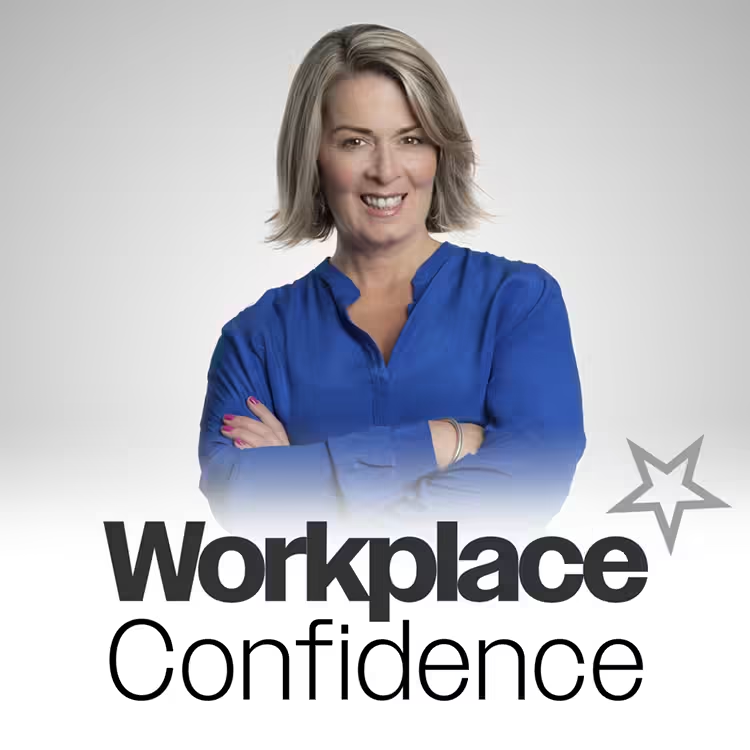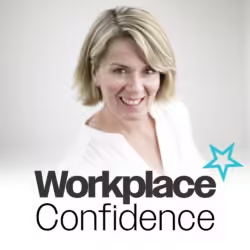
Coming up on the Workplace Confidence Podcast
Coming up on the Workplace Confidence Podcast
Bonus episodeComing up on the Workplace Confidence Podcast - Transcript
Penny Haslam: Hi, I'm Penny Haslam. Welcome to the Workplace Confidence podcast, the place where people professionals share the great work they do. The series is coming soon, but in this special episode, I'd like to give you a taster of what's in store.
First, let's hear from James Edgar, Chief People Officer at Signature Discovery, a fast-growing company in early-stage drug discovery. Now, 80% of his colleagues have a PhD, and we discuss how he's had to adapt his leadership style to meet the unique needs of these very clever people. He's had a remarkably varied career and is open about the personal challenges that can bring.
James Edgar: When I left investment banking to go into private prisons, that was a real jolt. You know, you kind of go from very flashy glass and steel in Canary Wharf to, you know, prisons across the UK. And so there's been times blatantly where I've had imposter syndrome and doubts of myself and so the confidence has definitely ebbed and flowed. I wouldn't say it's a constant. You kind of go through that. I think, you know, what I've learned is when moving from big company to small is sometimes you need to build your own support networks. So, you know, in big companies, sometimes you have that naturally, you have a big function. You can go and speak to people. When you're the number one in your function, it can be a bit lonely. And so I think, having the support networks that you know when it is tough, for the bad day, you've got something to kind of just fall back on.
Penny Haslam: More from James, coming up in his episode called "Leading a Team of Brilliant Minds."
Now, culture and corporate values are always hot topics. In her episode, "People, Planet, Purpose," Gillie Fairbrother, the Global Responsible Business Officer for Davies Group, offers a straightforward approach.
Penny Haslam: So how would you describe culture at Davies? It must be quite difficult to have one type of culture, given that you've got so many different professional services companies underneath your umbrella.
Gillie Fairbrother: Yeah and I think that's the point, right? You know, we see ourselves as one Davies family, and we have overarching values as a business. But, you know, you can't dictate values to people like that. People come with their own values, right? That's kind of how it works. But for me, it's actually, you know, we want diversity, right? So we wouldn't expect every business to be like each other because a call centre is not going to be the same as a Lloyd’s market managing agent syndicate. They're going to be working in very different ways, interacting with clients in very different ways. So I think it is understanding that nuance, which is what makes it so complicated to manage, because this is not one, you know. Yes, I'm looking at the strategy and helping advise on it, but culture is everybody's job.
Penny Haslam: Gillie Fairbrother there. Next, let's hear from Ian Turner, Chief of People and Place at UA92, a university academy disrupting higher education. In our conversation, we touch on one of my favourite topics, visible leadership.
Ian Turner: I do try and role model it. I would definitely not say I've aced it in any way, shape or form, but I do try and sort of lead by example. Again, I remember one very, very senior leader in an organisation I was at and literally would pull up outside in the car park, walk straight through the front door up to their office, and then conduct meetings and then walk straight again at six o'clock in the evening, back to the car and drive off. And I spoke to them one day, and we had a really fascinating conversation, and it was driven by the fact that that individual said, "Well, people don't want to hear from me. Why would they want to hear from me? I've got nothing in common with them." But it was a real confidence thing rather than an "Ooh." And I said, "You know, you've built this organisation. You've got people that you've brought into this organisation with entrepreneurial spirit and look at you really fondly, and they probably just want to hear from you about how you've done it," and those kinds of things. I think what happened was he built himself into this kind of CEO role that subconsciously had created the divide, and it was actually his confidence. He didn’t think people would want to speak to him rather than the other way around, so he flipped that on its head. I just said, "Just come and have a walk around," and people got chatting to him, you know, even if it was about his new car that he was buying or something along those lines. But they just got talking to him and you did see a change, you did see a change for sure.
Penny Haslam: Ian Turner there with his hands-on approach to resolving issues around visible leadership.
What you can expect from the Workplace Confidence podcast is frank conversations. I also chat with Jane Ayaduray. She's the Director of Global Diversity and Inclusion at an international law firm.
Penny Haslam: Overrated? OK, tell me more about that.
Jane Ayaduray: No, it's not tied to somebody's actual ability to do the job or their ability to make good decisions or their ability to lead or their ability to be compassionate or their ability to show good judgment or their ability to effectively manage risk. And so this whole idea that somebody needs to be displaying confidence in a certain way, particularly knowing that that might show up differently across culture or across gender or across ethnicity. I think it really makes me question what do we mean by confidence.
Penny Haslam: Forthright views on confidence in the workplace from Jane Ayaduray. More from her in the episode "Diversity, Inclusion, and Weaponised Confidence."
Of course, not all businesses have a dedicated HR or L&D professional in the building. That's the case with Property Tectonics, an SME working in the property sector. Coming up in the series, we hear from the MD, Esther Brady, about the communications challenges she faces.
Esther Brady: Frank conversations, crucial conversations, sometimes known as difficult conversations. How do people who rub along so nicely most of the time actually stomach taking on harder conversations that maybe isn’t so friendly? That’s one of my biggest challenges. I don't think it’s kind to say that the types of professionals we’ve got here are not the best at communicating, and I found that half of the problems that lead up to difficult conversations is because there has been a lack of communication. I think a lot of frank conversations might be avoided had more conversations gone on before that. But frank conversations, I think if you’re vulnerable, if you’re authentic, then people know that they can trust you and that if you need to have those difficult conversations, it’s because it’s necessary.
Penny Haslam: That’s Esther Brady. Look out for her episode titled "Buildings, Vision, and Purpose."
Let's finish for now with a clip from Charlotte Dean. She’s the founder of P3 People Management. Charlotte left the corporate world to focus on helping small and medium-sized businesses to create people-centric workplaces. In the 20 years she’s been in business, she’s learned to spot the organisations that get it.
Charlotte Dean: A lot of people can pay a lot of lip service to "Our people are our, you know, prized asset. You know, we look after our people." And they really don’t. You know, the culture doesn’t stack up. So what do you ask? How do you investigate that? It’s sitting with them, asking the right questions. How do you value people? How does that show up in the work? What are your key values? How do you ensure you bring the right people into your organisation? I think by asking questions about their own drivers, their motivations for their people within their business, you get an understanding of their passions, their motivations themselves for their business. And without sounding unclear, the more questions we ask, and one of our values, our key value is being curious and understanding, and I believe in asking why. I did it as a child, annoyingly so. I still do it now. I think if you can ask why and keep asking why, until you really get to the detail, that there provides you with the gems that someone wasn’t actually going to tell you in the first place because it wasn’t in front and centre of their mind.
Penny Haslam: Charlotte Dean there. So that's a brief taster of just some of the fabulous people professionals I'll be speaking to. There'll be more than 10 episodes released together to launch the forthcoming series.
For updates on the Workplace Confidence Podcast, please follow me, Penny Haslam, on LinkedIn. That's also where you can sign up for my newsletter that's packed with workplace confidence resources. If you're a people professional with insights to share, get in touch, drop me a line at hello@bitfamous.co.uk. Thanks for listening.

Finalist
Personnel Today
Learning and Development Supplier of the Year
2025

Finalist
Personnel Today
Learning and Development Supplier of the Year
2024

Finalist
Business Book Awards
Short Business Book
of the Year
2023

Finalist
Lloyds Bank Business Excellence Awards
Business Enabler
of the Year
2022


